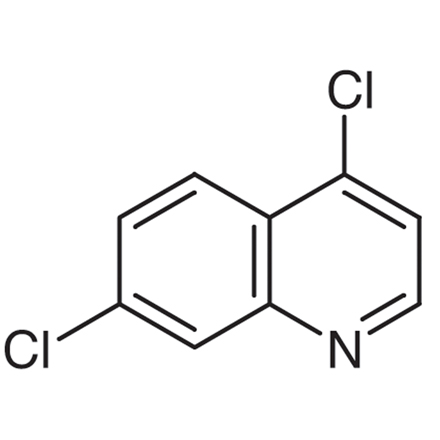4, 7-Dichloroquinoline, often abbreviated as DCQ, is a specific derivative of quinoline. Quinoline itself is a heterocyclic aromatic compound composed of a benzene ring fused to a pyridine ring. When two chlorine atoms are substituted at the 4 and 7 positions of the quinoline ring, it forms 4, 7-Dichloroquinoline. Here are some key points about 4, 7-Dichloroquinoline: Chemical Structure: The molecular formula of 4, 7-Dichloroquinoline is C9H5Cl2N, indicating it contains nine carbon atoms, five hydrogen atoms, two chlorine atoms, and one nitrogen atom. Physical Properties: The physical properties of 4, 7-Dichloroquinoline, such as its appearance, melting point, and boiling point, can vary depending on factors like purity and surrounding conditions. Synthesis: 4, 7-Dichloroquinoline can be synthesized through various methods, typically involving the chlorination of quinoline at the 4 and 7 positions. Different synthetic routes may be employed based on the desired yield, purity, and scalability. Applications: Chemical Synthesis: 4, 7-Dichloroquinoline serves as an intermediate in the synthesis of various organic compounds. Its unique structure makes it valuable in building more complex molecules. Pharmaceutical Research: Quinoline derivatives, including 4, 7-Dichloroquinoline, are investigated for their potential pharmaceutical properties. Researchers explore their activity against various diseases, including malaria, cancer, and microbial infections. Material Science: Some quinoline derivatives find applications in material science, such as in the synthesis of luminescent materials, polymers, or catalysts. Biological Activity: Depending on the specific molecular structure and substitutions, quinoline derivatives like 4, 7-Dichloroquinoline may exhibit biological activities. This could include antimicrobial, antimalarial, antiviral, or anticancer properties. However, the biological activity of a compound is complex and depends on various factors, including its interaction with biological targets. Safety and Handling: Like with any chemical compound, proper safety measures should be followed when handling 4, 7-Dichloroquinoline. This includes wearing appropriate personal protective equipment, working in a well-ventilated area, and following established protocols for storage and disposal. Overall, 4, 7-Dichloroquinoline is a compound of interest in both chemical synthesis and pharmaceutical research due to its unique structure and potential biological activities. 4, 7-Dichloroquinoline manufacturer in Ankleshwar. 4, 7-Dichloroquinoline manufacturer in India.
Chat with us on WhatsApp
×
This is your website preview.
Currently it only shows your basic business info. Start adding relevant business details such as description, images and products or services to gain your customers attention by using Boost 360 android app / iOS App / web portal.

2024-04-02T04:44:02
4, 7-Dichloroquinoline, often abbreviated as DCQ, is a specific derivative of quinoline. Quinoline itself is a heterocyclic aromatic compound composed of a benzene ring fused to a pyridine ring. When two chlorine atoms are substituted at the 4 and 7 positions of the quinoline ring, it forms 4, 7-Dichloroquinoline. Here are some key points about 4, 7-Dichloroquinoline: Chemical Structure: The molecular formula of 4, 7-Dichloroquinoline is C9H5Cl2N, indicating it contains nine carbon atoms, five hydrogen atoms, two chlorine atoms, and one nitrogen atom. Physical Properties: The physical properties of 4, 7-Dichloroquinoline, such as its appearance, melting point, and boiling point, can vary depending on factors like purity and surrounding conditions. Synthesis: 4, 7-Dichloroquinoline can be synthesized through various methods, typically involving the chlorination of quinoline at the 4 and 7 positions. Different synthetic routes may be employed based on the desired yield, purity, and scalability. Applications: Chemical Synthesis: 4, 7-Dichloroquinoline serves as an intermediate in the synthesis of various organic compounds. Its unique structure makes it valuable in building more complex molecules. Pharmaceutical Research: Quinoline derivatives, including 4, 7-Dichloroquinoline, are investigated for their potential pharmaceutical properties. Researchers explore their activity against various diseases, including malaria, cancer, and microbial infections. Material Science: Some quinoline derivatives find applications in material science, such as in the synthesis of luminescent materials, polymers, or catalysts. Biological Activity: Depending on the specific molecular structure and substitutions, quinoline derivatives like 4, 7-Dichloroquinoline may exhibit biological activities. This could include antimicrobial, antimalarial, antiviral, or anticancer properties. However, the biological activity of a compound is complex and depends on various factors, including its interaction with biological targets. Safety and Handling: Like with any chemical compound, proper safety measures should be followed when handling 4, 7-Dichloroquinoline. This includes wearing appropriate personal protective equipment, working in a well-ventilated area, and following established protocols for storage and disposal. Overall, 4, 7-Dichloroquinoline is a compound of interest in both chemical synthesis and pharmaceutical research due to its unique structure and potential biological activities. 4, 7-Dichloroquinoline manufacturer in Ankleshwar. 4, 7-Dichloroquinoline manufacturer in India.
2024-04-02T04:44:02
Keywords
- DCQ
- area
- India
- yield
- purity
- malaria
- storage
- desired
- disposal
- interest
- Handling
- C9H5Cl2N
- polymers
- protocols
- antiviral
- catalysts
- key points
- appearance
- Ankleshwar
- 7 positions
- scalability
- Researchers
- interaction
- intermediate
- benzene ring
- chlorination
- Applications
- melting point
- pyridine ring
- boiling point
- antimicrobial
- substitutions
- quinoline ring
- various factors
- various methods
- Material Science
- various diseases
- unique structure
- nine carbon atoms
- molecular formula
- one nitrogen atom
- complex molecules
- chemical compound
- two chlorine atoms
- biological targets
- Chemical Structure
- Chemical Synthesis
- Biological Activity
- Physical Properties
- specific derivative
- five hydrogen atoms
- microbial infections
- Quinoline derivatives
- luminescent materials
- anticancer properties
- surrounding conditions
- proper safety measures
- Pharmaceutical Research
- various organic compounds
- Different synthetic routes
- specific molecular structure
- heterocyclic aromatic compound
- potential biological activities
- potential pharmaceutical properties
- 4, 7-Dichloroquinoline manufacturer
- appropriate personal protective equipment

Submit Your Enquiry